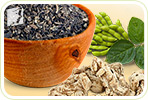Vaginal dryness, a common symptom of menopause, typically occurs due to hormonal imbalance. Throughout the menopausal transition, approximately 80% of perimenopausal women and 50% of postmenopausal women experience this symptom. Continue reading to find out what causes the condition and how to relieve vaginal dryness during menopause.
Why Does Vaginal Dryness Occur?

Estrogen, a hormone naturally produced in a woman's body, regulates many different functions, including keeping the vaginal walls moist. This natural lubrication is slightly acidic in order to protect the vagina from any bacteria or other invading infections. A decrease in estrogen means a lack of sufficient lubrication production.
In turn, the vagina becomes dry and thin, which makes the walls sensitive and increasingly weak. Additionally, a lack of lubrication results in lower acid levels and puts a woman at a greater risk of developing urinary tract and yeast infections.
Symptoms of Vaginal Dryness
In addition to dryness, women are likely to experience other symptoms due to a shortage of vaginal lubrication. These symptoms include: itching, urinary tract infections, incontinence, and painful intercourse. When these ailments start to affect a woman's daily life, it may be necessary to treat dryness. Fortunately, there are many ways to manage the issue.
How to Relieve Vaginal Dryness
Like with other menopausal symptoms, there are several approaches to treating vaginal dryness. Many women combine elements of different approaches to suit their preferences and personal circumstances.
Lifestyle changes

Implementing subtle, positive lifestyle changes can go a long way managing your menopause symptoms, including vaginal dryness. Increasing your intake of soy-based foods alongside healthy diet full of fruit and vegetables - as well as exercising daily and practicing stress relief techniques - can help the body to maintain healthy hormone levels. Regular sexual activity will also increase blood flow to the vaginal walls, making intercourse less painful over time.
Alternative medicines
Water-based lubricants can add moisture to the vagina, alleviating the symptoms of vaginal dryness. In addition, there are herbal remedies in the form of phytoestrogenic and hormone- regulating supplements that can help with vaginal dryness.
Phytoestrogenic supplements contain plant-based hormones that mimic the function of estrogen. However, this makes the body less efficient at producing its own. In contrast, hormone-regulating supplements don't contain any hormones. Instead, they nourish the endocrine glands to produce their own naturally.
Many women agree that a healthier lifestyle combined with an alternative medicines is the best way to treat menopausal symptoms and restore hormonal balance. Click on the link below to know more about the different ways to relieve vaginal dryness.
Sources
- Love, Susan M.D. Menopause and Hormone Book. New York: Three Rivers Press, 2003.
- "Vaginal Dryness." Mayo Clinic Health Resource. 2007.
- The Changing Body: Menopause Handbook. (n.d)."Vulvovaginal Symptoms." Retrieved ffrom www.menopause.org.


